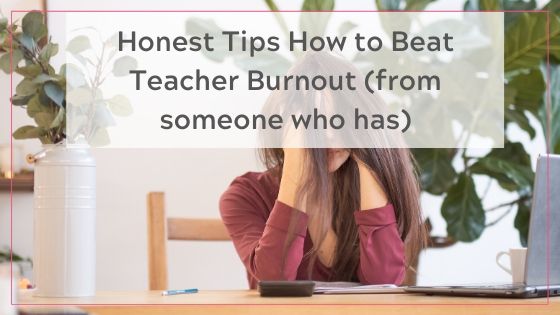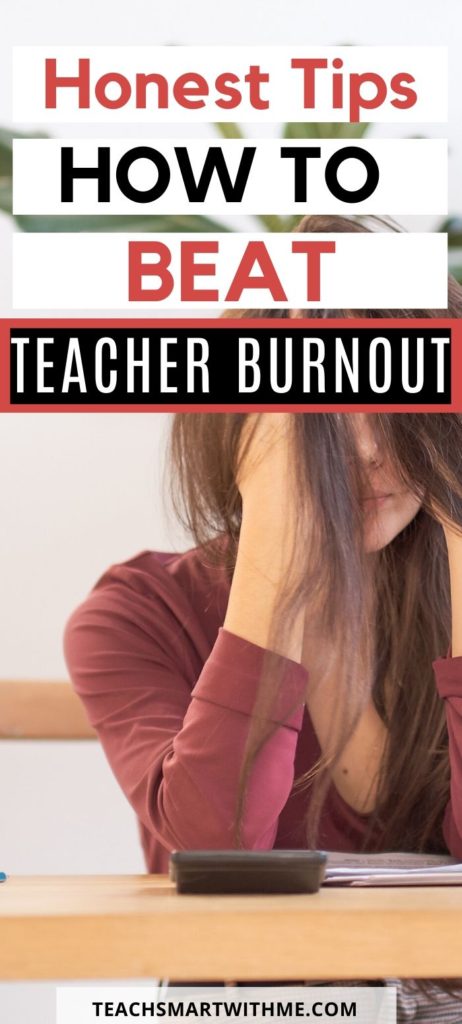Are you a burned-out teacher? Or do you fear burning out? It’s a huge problem! Read my 7 honest tips on how to beat teacher burnout from my personal experience in the school trenches.

Many teachers probably have their own personal ideas of how to beat teacher burnout, but I think the advice needs to come from someone that has experienced it – literally, not someone who uses this term to describe their exhaustion.
Exhaustion is definitely one of those things that every teacher experiences, especially at the end of a busy school term and particularly the year. But I don’t think burnout is just exhaustion on its own.
Burnout is an accumulation of teacher stress, exhaustion and overwork – When you feel like you have hit a brick wall and your body says, “I can’t do this anymore!” and won’t cooperate. When you can’t get out of bed because you are chronically fatigued and you’re negative. All. The. Time; and maybe you’re experiencing some sort of depression or anxiety or both.
In an effort to stop teacher burnout, learn to work smarter with these FREE tips. Get them HERE:
What is teacher burnout?
But what do the experts say about burnout?
Well, Psychology Today describes burnout out as “a state of chronic stress that leads to:
- physical and emotional exhaustion
- cynicism and detachment
- feelings of ineffectiveness and lack of accomplishment
This explanation also goes onto add that if you’re in “full-fledged” burnout you are no longer able to function effectively on a personal or professional level.
Not a fun situation to find yourself in. (I can tell you, I know the feeling). But unfortunately, statistics tell us that teacher burnout is on the rise.
However, I’d like to think that anyone that’s experienced these types of symptoms would be the authority on burnout because they have had to pull themselves out of the deep hole or from under a very black cloud to reinstate their health and wellbeing.
This is where I had found myself.
I hate to admit it, but the burden of teaching, the workload and the chronic stress I experienced from day-to-day; as well as the pressure to ‘be everything to everyone’; to students, other teachers, parents, administration, and obviously my boss, took a huge toll on my health.
This condition didn’t happen overnight. It crept up on me… but that’s another story.
You’ll be pleased to know that I’ve found that with time away from teaching, to rest, recuperate and get significant support from a variety of health professionals, as well as my beautiful enduring friends, I’ve been able to pull through.
But it’s taken time.
In reflection of this dark period in my life, I’ve been considering how other teachers can beat teacher burnout because I really don’t want you to have to go through something like this.
But, before I discuss how to beat teacher burnout, I need you to know that 65% of teachers that responded to the burnout survey identified signs of burnout like me.
This shows that my case is not isolated. Not here in Australia or in other parts of the teaching world either.
So what can be done?
Work smarter, not harder as a teacher with these 25 tips.
One of the first things that I believe all teachers must do, is be very intentional about looking for and identifying the warning signs of burnout, so that they can prioritize their own health and well-being above the job. To help you do this Take the Teacher Burnout Quiz here.
To help you with this, I want to share my thoughts about what I’ve learnt from my own personal burnout experiences and things that might help you to avoid this serious issue many teachers.
Take or leave these suggestions, but I hope they might indeed slow down burnout and help you catch it before it takes hold.
7 tips how to beat teacher burnout
1. Set very clear boundaries & limits for yourself
Setting healthy working boundaries is a necessity and it my number one tips how to beat teacher burnout. I’m not kidding about this.
The problem I believe, is that many teachers are ‘people pleasers‘, by nature. I know I fit into this category. People pleasers are generally very caring loving people who mostly say ‘yes’ to everything because they don’t want to disappoint or cause problems for others.
This is when you say ‘yes,’ when you really want to say ‘no’. It then becomes very hard to start saying ‘no’ when you really want to.
Are you like this?
I think it begins back when you’re first out of college/university. Often so desperate for work you take a job because it’s offered to you. You subsequently agree to everything asked of you, to keep people happy — like the extra playground duties or after school activities, because you want other teachers to know you’re a ‘team-player’.
It continues… you say ‘yes’ to things, but start to feel resentful, like you’re compromising yourself. You break your own limits, you know you should have implemented, that could protect your energy and stop exhaustion from the excessive workload.
This was me… maybe it’s you too!
Now’s the time to make some significant changes. Start by clearly drawing a line in the sand, so to speak, with what you will and won’t do as a teacher. Begin by making yourself and your wellbeing a priority, and if something doesn’t serve your needs, say No! – This is hard, I know… but necessary!
Related Article: How to Set Boundaries as a Teacher and Why it’s So Important
2. Get balance in your life
Getting work-life balance and avoiding burnout, is all about putting your job where it belongs and in a healthy position in your life. It’s got to become more sustainable to stop the drain and energy depletion that many educators are experiencing.
To do this, think about how many hours are you prepared to work?
Most people’s job outside of teaching only requires them to commit to 40 hours per week.
How many hours will you work to get the life-balance you need? – Time to have with your family, enjoying social activities and hobbies and time to replenish your energy… all without the guilt.
Another statistics from the teacher burnout survey (taken by over 12 000 educators) revealed that 85% of teachers work unsustainably with significant risks to their health as a result. This is so wrong!
It’s time to take stock of your life. Think about what you need to be able to thrive and be happy. Only you can make the changes and set the boundaries that are necessary to be more balanced!
Related Articles:
- Secrets for Work-Life Balance for Teachers
- Teachers Want Work-Life Balance? Try These 2 Important Tips!
3. Take some time off, if you’re exhausted
As I said, start to listen to your body. It’s very intuitive and often we ignore it or are just tone-deaf to what it’s trying to tell us. But listening is key!
If you’re feeling exhausted. If you’re getting sick all the time. If you have headaches and are short-tempered with everyone around you, (Read here for other burnout signs and symptoms), now’s the time, my friend, to take some mental health leave. Don’t wait for someone to give you approval. IT WON’T COME!
You need to do it for yourself.
Learn from me. I didn’t listen to what my body was trying to tell me. I had people saying to me to take some time away from school. In particular, I remember one very caring, elderly teacher, lovingly try to get me to take an absence of leave to rest. She seemed to know what I needed — but I didn’t listen. I thought I was ok…but I really wasn’t!
If you think your body has lost the power of intuition, hear what your loved ones around you are honestly saying. Don’t wait until it is too late like I did. Don’t be a martyr!!
TAKE THE TEACHER BURNOUT QUIZ HERE – Find out if you’re in the danger zone!
4. Make time for self-care
I’m sure you’ve heard of the huge importance of self-care for teachers and the necessity to meet your own personal health and well-being needs. I’m not going to bang on about it here. Needless to say, it’s a MUST to prioritize yourself, your energy and your mindset with a simple daily self-care routine, to minimise the risks of burnout happening to you. It’s crucial for your well-being.
N.B If you think burnout has already taken hold of you, intentional daily self-care and rest is the only way to heal.
Related Articles:
- Teachers: Enjoy the 7 Benefits of a Self-Care Bath Routine
- What’s All the Big Fuss About Self-Care for Teachers
5. Connect with others
Social interactions and time spent with friends are both imperative to slow burnout, especially if you have an understanding support network of other teachers.
Debriefing regularly, is a healthy way to release the pent-up frustrations, and feel the empathy and the strength of others.’ As well as enjoying the company of people in a life outside of school.
Keep your friends close, and ensure to use their support when you need it. Like the saying goes – ‘A problem shared, is a problem halved.’
Related Article: 6 Easy Holiday Energy Boosters for Teachers
6. Manage your Stress
It’s clear that people in high-stress jobs run the risk of burnout, and the statistics support this. While stress comes with the territory in a profession like teaching, it therefore becomes a necessity to learn to manage your stress and release it from your body. This is possible! – even though I was unaware of this for many years.
I’m now so passionate about informing other educators of the huge need to calm their nervous system from their highly stressful role.
Stress management is possible, with targeted relaxation strategies, that will help minimize the negative health impacts that chronic stress can cause. Seek help, if you need support with this and read more about the topic.
Related Articles:
- 15 Easy Relaxation Strategies to Beat Stress!
- A Straight-Forward Tip How to Relieve Teacher Stress (Who Won’t Believe)
- Why Is It So Important to Get a Handle on Teacher Stress?
7. Change your mindset + get back to your passion
Mindset is a pretty new concept for me, but I’m now understanding that our mindset is crucial for whether you’ll beat burnout or not.
It’s in the way you think about your job that’s all important.
If you’ve been pushing back the effects of burnout, you’ll have found that you end up becoming very negative about the job and can feel frustrated with the lack of control you have as a teacher. This type of negative mindset can eat you up.
If you’re going to successfully beat burnout, your thinking is key. Be intentional about making a mindset shift to pull yourself out of the negativity. By changing your thoughts, it will subsequently affect your emotions and then how you react to what comes your way.
Your thinking is such a critical component to reduce the drain that’s happening to you.
Shifting a negative mindset requires training and time, but you can begin to make the change by firstly wanting to. Then, by focusing on the good things in your life (having a grateful attitude), with positive affirmations and mindfulness. I know using these strategies are working well for me and I would highly recommend them for you too.
Read the following related articles to help you with mindset.
Related Articles:
- 19 Positive Teacher Affirmations You Need to Start Now!
- The Benefits of Foster a Growth Mindset for Teachers
- Learn How to Improve Teacher Happiness with Gratitude Journaling
Final words on how to beat teacher burnout
Finding yourself in the burnout spiral can be a very difficult time for anyone, but I hope with my words and these important ideas help you get on the road to improving your wellbeing… and hopefully avoid teacher burnout altogether.
Don’t be the teacher that needs to have a breakdown before making changes in your life.
I know you can do this!.
Here’s the summary of tips how to beat teacher burnout:
- Set clear and healthy boundaries for your teaching job
- Be intentional about work-life balance
- If needed, take time away from teaching to rest and heal
- Prioritize your own needs with self-care
- Build a supportive network of friends and connect regularly
- Be intentional about stress management
- Learn to make a mindset shift with gratitude journaling & positive affirmations
And before you go, Take the teacher burnout quiz here.
Take care my friend
Michelle x
Related Posts
PIN FOR LATER!



Leave a Reply